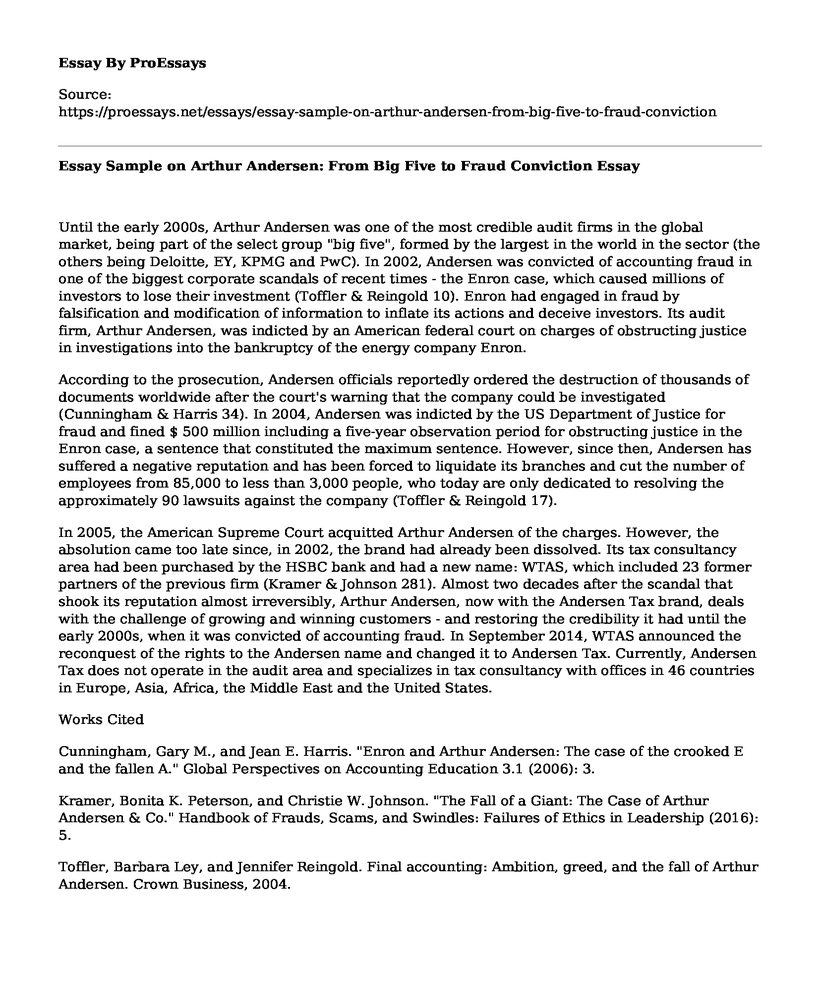Until the early 2000s, Arthur Andersen was one of the most credible audit firms in the global market, being part of the select group "big five", formed by the largest in the world in the sector (the others being Deloitte, EY, KPMG and PwC). In 2002, Andersen was convicted of accounting fraud in one of the biggest corporate scandals of recent times - the Enron case, which caused millions of investors to lose their investment (Toffler & Reingold 10). Enron had engaged in fraud by falsification and modification of information to inflate its actions and deceive investors. Its audit firm, Arthur Andersen, was indicted by an American federal court on charges of obstructing justice in investigations into the bankruptcy of the energy company Enron.
According to the prosecution, Andersen officials reportedly ordered the destruction of thousands of documents worldwide after the court's warning that the company could be investigated (Cunningham & Harris 34). In 2004, Andersen was indicted by the US Department of Justice for fraud and fined $ 500 million including a five-year observation period for obstructing justice in the Enron case, a sentence that constituted the maximum sentence. However, since then, Andersen has suffered a negative reputation and has been forced to liquidate its branches and cut the number of employees from 85,000 to less than 3,000 people, who today are only dedicated to resolving the approximately 90 lawsuits against the company (Toffler & Reingold 17).
In 2005, the American Supreme Court acquitted Arthur Andersen of the charges. However, the absolution came too late since, in 2002, the brand had already been dissolved. Its tax consultancy area had been purchased by the HSBC bank and had a new name: WTAS, which included 23 former partners of the previous firm (Kramer & Johnson 281). Almost two decades after the scandal that shook its reputation almost irreversibly, Arthur Andersen, now with the Andersen Tax brand, deals with the challenge of growing and winning customers - and restoring the credibility it had until the early 2000s, when it was convicted of accounting fraud. In September 2014, WTAS announced the reconquest of the rights to the Andersen name and changed it to Andersen Tax. Currently, Andersen Tax does not operate in the audit area and specializes in tax consultancy with offices in 46 countries in Europe, Asia, Africa, the Middle East and the United States.
Works Cited
Cunningham, Gary M., and Jean E. Harris. "Enron and Arthur Andersen: The case of the crooked E and the fallen A." Global Perspectives on Accounting Education 3.1 (2006): 3.
Kramer, Bonita K. Peterson, and Christie W. Johnson. "The Fall of a Giant: The Case of Arthur Andersen & Co." Handbook of Frauds, Scams, and Swindles: Failures of Ethics in Leadership (2016): 5.
Toffler, Barbara Ley, and Jennifer Reingold. Final accounting: Ambition, greed, and the fall of Arthur Andersen. Crown Business, 2004.
Cite this page
Essay Sample on Arthur Andersen: From Big Five to Fraud Conviction. (2023, Mar 27). Retrieved from https://proessays.net/essays/essay-sample-on-arthur-andersen-from-big-five-to-fraud-conviction
If you are the original author of this essay and no longer wish to have it published on the ProEssays website, please click below to request its removal:
- Connections Between White-Collar and Organized Crime Essay
- Legalization of Marijuana Production for Individual Use Essay Example
- Immigration Contributes to Increased Crime Rates Essay Example
- O.J. Simpson Murder Case: Trial, Dream Team & Confusion - Essay Sample
- Essay Example on Supreme Court Establishes Guidelines for Expert Testimony
- Essay Example on Murder Investigation at 123 Harriet Avenue, Key West
- Essay on Empowering Maasai Women: The Pastoral Women's Council's Advocacy and Achievements







